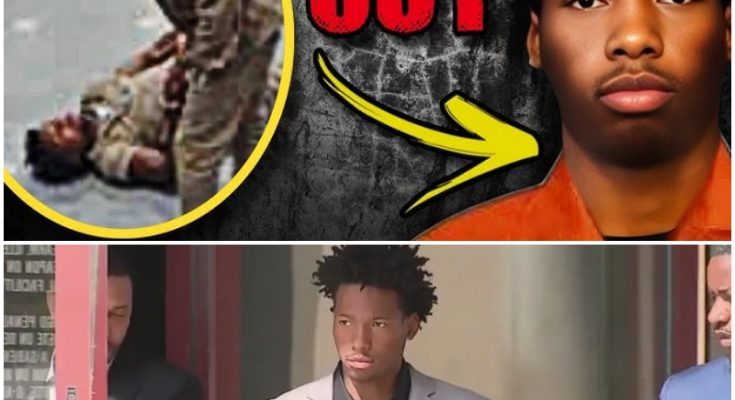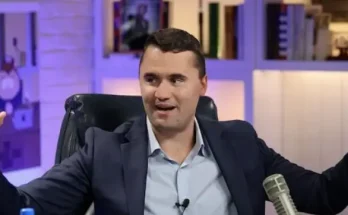Karmelo Anthony’s Initial 24 Hours in Custody: An Ex-Con Unveils the Nightmare Awaiting the Fallen Star
It is now confirmed: Karmelo Anthony’s sentencing is scheduled for June 2026, and with this announcement, the focus has shifted from the courtroom proceedings to the stark reality of what lies ahead. If Anthony believed that incarceration marked the conclusion of his ordeal, he is in for a devastating realization—state prison presents an entirely different challenge. No one understands this better than Joe, a man who endured a decade within those very walls and is now revealing the first 24 hours that will irrevocably alter Anthony’s life.
The instant the gavel strikes and Anthony is declared guilty, everything transforms. The days of solitary confinement, family interactions, and legal optimism are over. He will remain in county jail, awaiting his sentencing, but that is merely the introduction. The true horror commences when the prison transport arrives—a dilapidated, steel behemoth that carries the condemned into uncertainty. Joe likens it to a scene from a horror movie: “You’re shackled at the wrists and ankles, chained to strangers, shuffling toward a future you cannot even fathom.” The bus serves as a mobile gossip hub, filled with seasoned inmates exchanging tales of the yard and chilling anecdotes. Anthony, despite his bravado, will remain silent—wide-eyed, apprehensive, and completely unready.
The journey itself is a mental trial. Some inmates boast of having survived the most brutal yards. Others share cautionary tales about locations where “even the guards are fearful.” For Anthony, whose only encounter with adversity has been a life of luxury and pretense, the pressure will be overwhelming. Joe does not hold back: “County jail is akin to a ball pit at McDonald’s compared to what lies ahead.”
Arrival at the Texas Reception and Evaluation Center resembles a boot camp intended to dismantle your sense of self. Guards issue commands with the intensity of drill sergeants, eliminating any remaining illusions of authority. Anthony will be compelled to line up, still in shackles, and disrobe alongside a dozen other men—some toughened, some shattered, none concerned with his past existence. “You’re instructed not to glance left or right, merely to stand there, exposed and humiliated,” Joe remembers. “It’s the moment you come to understand that you are no longer unique, not anymore.”
Following this is the notorious group shower—three minutes of exposure under the scrutinizing gaze of guards and the apathetic stares of fellow inmates. There is no privacy, no dignity, only a frantic rush to cleanse oneself and cover up. “You’re drying off with a towel no larger than a dish rag, and everyone is shouting at you to hurry. It’s degrading, and everyone is aware of it,” Joe recounts.
However, the psychological torment does not cease there. Inmates are herded into a cramped space, compelled to view a grainy, decades-old warning video regarding the perils of prison rape and violence. “It serves as their legal protection, but it’s essentially a wake-up call: you are in hell now, and no one is coming to rescue you,” Joe clarifies. Even the most hardened inmates fall silent during this grim orientation, the harsh reality of their new environment settling in.
Next is the haircut—no style, no compassion, just a buzzing razor that removes the last remnants of individuality. For Anthony, who has always valued his appearance, it is a final, humbling blow. “That stylish rapper haircut? Gone. You are merely another face in the crowd now,” Joe chuckles, but there is no genuine humor in his words.
The intake procedure proceeds with both medical and psychological assessments, photographs taken from various angles, and a documentation of tattoos—particularly those that may suggest gang connections. This is where Anthony’s bravado could have severe consequences. That infamous image of him displaying gang signs? It is already part of his record, and prison authorities are not tolerant of individuals who falsely claim gang affiliation.
He is likely to be categorized as a gang member, which would result in his immediate placement in the most dangerous areas—yards dominated by the very gangs he feigned allegiance to. “That’s a death sentence in here,” a corrections expert informed us. “Prison gangs view false-claiming as the utmost disrespect. They will make an example out of him.”]
Furthermore, Anthony’s team has openly declared a conflict against white supremacist gangs, effectively marking him as a target even before he is assigned to a cell. The Aryan Brotherhood of Texas is already targeting him, and the Vice Lords—whose signs he displayed—are compelled to retaliate for the affront. “He’s entering a war zone,” Joe cautions.
After enduring hours of humiliation, anxiety, and soul-crushing realizations, Anthony will ultimately be assigned a cell, left to reflect on the grim reality that lies ahead. The following days will present additional challenges, further assessments, and the slow, painful acknowledgment that this is not a film, a rap song, or a game. It is a matter of survival, plain and simple.
Experts concur: Anthony’s initial 24 hours will be a trial unlike any he has previously encountered. Dr. Geraldine Hurst, a psychologist specializing in prison environments, states, “The intake process is intended to dismantle you completely, to erase your former identity and reduce you to just another number. For someone like Anthony, it results in psychological devastation.”
As the globe observes, one fact remains clear: Karmelo Anthony’s existence of luxury, confidence, and impulsive decisions has brought him to a point where none of that holds significance. In incarceration, there are no admirers, no opportunities for redemption, and no way to flee from the truth he has fashioned. His initial 24 hours will be the most prolonged—and the most frightening—of his existence. For many, this epitomizes the essence of justice delivered.



